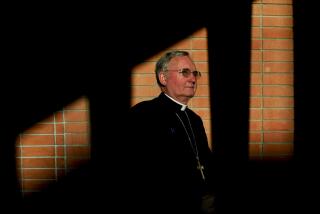Bishop Keeps a Steady Hand on Helm
- Share via
NEW YORK — Midway in a 12-year term, Episcopal Presiding Bishop Edmond Lee Browning has a solid, working tie with his most prominent member, President Bush, but finds skippering the church often is rough sailing.
That’s the way Episcopalians navigate, he said. But facing the crosscurrents can be enhancing, he added, noting that waves always have been stirred when believers grapple with their deepest convictions.
“History bears that out,” he said in an interview. “There’s no way we can shy away from these debates.”
This particularly has been the case lately with a church considered a “bridge” between Protestantism and Catholicism, and which cherishes its comprehensive diversity in races, culture and understandings of Scripture.
“I think it’s good, struggling with the issues,” he said. “To be fearful of change is to be fearful of the gifts of the Holy Spirit. The Holy Spirit never lets us stand still, but moves and challenges us and convinces.”
However, concerning charges by internal critics that the church is off course and has abandoned adherence to its historic faith and Scriptures, he offered a succinct comment: “Nonsense!”
Browning said that leading the prestigious 2.5-million-member church, rippling with contentions that now threaten a marginal schism, has required a continual round of problem solving.
“You can’t be a problem solver and bring about reconciliation unless you listen to all sides,” he said. He has had to concentrate more on that than anticipated, “trying to get people to listen to one another,” he added.
It’s essential to keep channels open for discussing differences, he emphasized. “The debates keep pushing us toward finding out how better to work together and to discern God’s will for our time.”
But just back from a trip to Ft. Worth last week to try to calm a germinating factional revolt, he added wryly: “I wouldn’t mind a couple of days off from it.”
A white-haired, Texas-reared churchman of 62, Browning spends much of his time on the road, taking part in local church affairs and mediating problems, as well as keeping up ecumenical chores in this country and abroad.
Generally, the church is in “good health, even with its problems,” he said, and is displaying a spirit of “renewal and dedication” that has turned a longtime membership decline “back upward. Growth has begun.”
“Out in the congregations and dioceses, I see people really sacrificing, even in the recession, to support the church. More work is being done in regard to the brokenness in communities, the homeless and unemployed.
“The church also has become more involved in evangelism, sharing the good news. Episcopalians didn’t used to take much part in that, but they’re waking up to it. The church is really reaching out to people in a time of growing hunger for a message of hope.”
Once considered a church of the elite, the denomination now is thoroughly inclusive of races and economic and educational levels, but it still has a high proportion of the wealthy and influential--about 20% of Congress and of corporate heads.
Although denominational membership is just 1% of the population, 12 of the 40 U.S. presidents--30%--have been Episcopalians, including Bush.
“Our relationship is good, and for that I’m grateful,” Browning said. “We do not always agree, but he listens very carefully. I think he is a man of prayer who takes his church life seriously. . . . He is a model in that regard.”
As chief pastor of Bush’s denomination, Browning has met with him personally half a dozen times and has had numerous telephone conversations and letter exchanges with him.
On the church political front, Browning has sought, so far without avail, to conciliate a traditionalist group that says it plans to form a separate, non-geographical “missionary diocese” for dissenting congregations.
“This plan would take some people outside the Episcopal Church,” Browning said. “It’s a tragedy. It would leave them out flying in the wind.”
The group charges various “liberal trends,” including admitting women to ordination and prayer-book revision of more than a decade ago, and current study of whether to approve ordination of active homosexuals.
“I still hope to find some way to bring these people back,” Browning said. “I won’t give up trying. We need their voices.”
He said the overwhelming majority of the church “will hold together.” But the “presiding bishop is bishop of the whole church,” concerned for all its diverse segments, he added.
More to Read
Sign up for Essential California
The most important California stories and recommendations in your inbox every morning.
You may occasionally receive promotional content from the Los Angeles Times.













